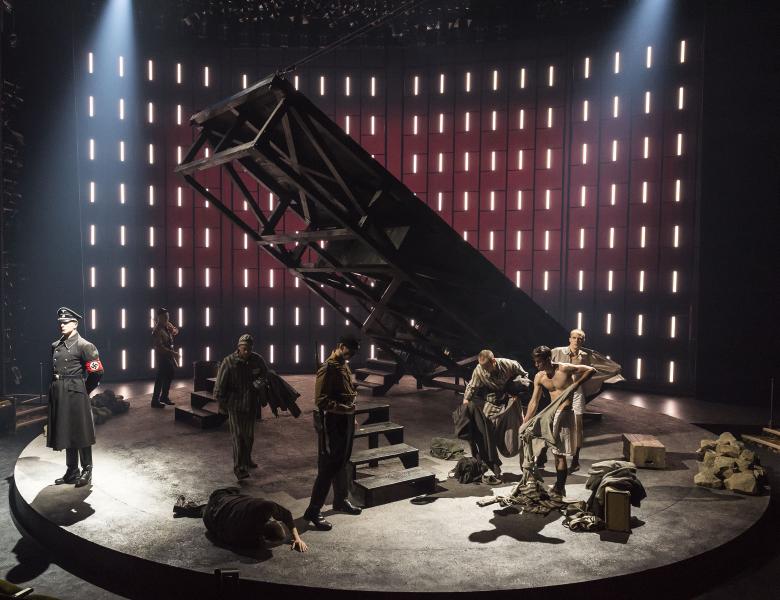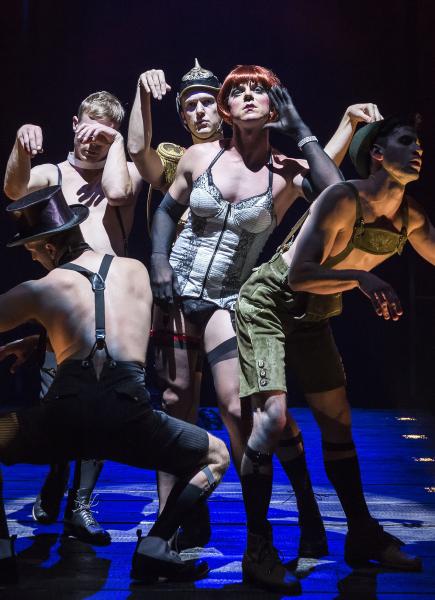'Bent' Is That Nightmare You're Grateful You Had
When one hears the premise of “Bent,” one of the Center Theatre Group’s latest productions at the Mark Taper Forum—the overarching narrative of the experience of homosexual men during the Holocaust in Europe—it’s easy to be alienated by what could easily be a loaded melodrama. We’ve all seen a great deal of films and plays about the Holocaust and it’s become easy to write them off as typical. But “Bent,” under the direction of Moisés Kaufman, is far from typical. It’s a nightmare, and only in the best way—a fever dream that reaches a state of horror at such a pinnacle as is only achieved in one of the rarest strokes of genius.

Martin Sherman’s play follows the story of Max (Patrick Heusinger), an opportunistic and improvisationally entrepreneurial gay man living in Nazi-era Berlin whose life is turned upside down when an unexpected night guest is taken by the S.S. Max’s life becomes no longer an economic but a life-or-death race for survival as he and his lover, Rudy (Andy Mientus), must flee their home and take the long road to shelter as the Nazis begin their systemic hunt for homosexuals in their midst. Max will stop at nothing to survive until he’s eventually halted in his tracks by the many ultimatums that are begot by such worldwide panic, and must reconcile the easily dismissed human needs for intimacy and love in such a time that the barest essentials of life are at stake.
“Bent” is one of the most uniquely crafted plays that L.A. has seen in a while, maneuvering genre and style with elegant innovation that makes the work a true emotional epic. At times a gut-wrenching historical drama, an existential black comedy akin to Beckett and a chaotic frenzy reminiscent of the turn-of-the-century expressionistic plays, “Bent” has a style that allows for a truly engaging and fully realized depiction of the terrors and tragedies of the Holocaust. Astounding performances, particularly from Heusinger, Mientus, and Charlie Hofheimer as Horst, another gay survivalist trying to keep his head low in the wake of Nazi capture give the audience human faces from which it can have a brutally fragile emotional stake in a history almost too horrifying to be believed. Meanwhile the writing and performance of the Nazi storm troopers, particularly in the first act, presents possibly the most frightening rendition of the Nazi archetype our culture has come to conceive that has ever been realized onstage.
But perhaps the most dramatically confrontational and compelling element of the production is its design. Without the inspired and unforgettable lighting and sound design by Justin Townsend and Cricket S. Meyers, the mythic Nazi presence that dominates the first act of the play would be impossible to render so forcefully. Scenic transitions with Beowulf Boritt’s elegant set design are awe-inspiring and the design complements the structure of the play so well that the first act moves along with great gusto. Equally appropriate choices are made in the second act, which undergoes a dramatic structural change as the entire act takes place in one location with a much more limited number of temporal shifts. Despite such a dramatic change, the play never loses focus nor does it cease to compel, and any audience member who enters willing to be strung along for the ride will never be disengaged from the action.

This play is incredibly relevant to the times around us. Interestingly similar to “Bad Jews,” which opened at the Geffen earlier this summer, one of the major themes of “Bent” concerns identity. What do we owe it? Do we have a right to disregard or give up our identity? What can be chosen and what cannot be chosen? And, perhaps the most poignant, to what extent does our identity actually make us different from our fellow human beings? After the show, one can leave a floating light in the pools surrounding the Taper as a memorial to all those who lost their lives in the Holocaust, and particularly to the gay men and women who were persecuted for being true to an identity that was unacceptable in perhaps the cruelest totalitarian state in human history. It’s a testament to the endurance of the human spirit and our innate ability to empathize with those who have gone before us, and who live among us even today. The social importance of “Bent” cannot be understated, and while it is an excruciating play to watch, may be one of the most crucial nights spent at the theatre in a long time.
“Bent” will run through August 23rd at the Mark Taper Forum (135 N. Grand Avenue, Los Angeles). Tickets are $25 - $85. For more information, please visit www.CenterTheatreGroup.org.
Reach Theater and Dance Editor Ryan David McRee here.
For more Theater and Dance coverage, click here.



